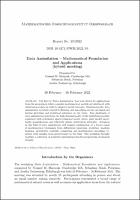Abstract
The field of "Data Assimilation'' has been driven by applications from the
geosciences where complex mathematical models are interfaced with
observational data in order to improve model forecasts. Mathematically,
data assimilation is closely related to filtering and smoothing on the
one hand and inverse problems and statistical inference on the
other. Key challenges of data assimilation arise from the
high-dimensionality of the underlying models, combined with systematic
spatio-temporal model errors, pure model uncertainty quantification and
relatively sparse observation networks. Advances in the field of data
assimilation will require combination of a broad range of mathematical
techniques from differential equations, statistics, machine learning, probability, scientific computing
and mathematical modeling, together with insights from practitioners in the field.
The workshop brought together a collection of scientists
representing this broad spectrum of research strands.

